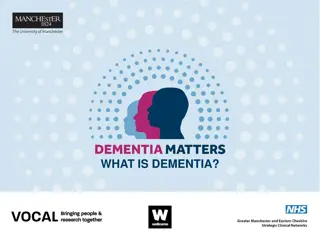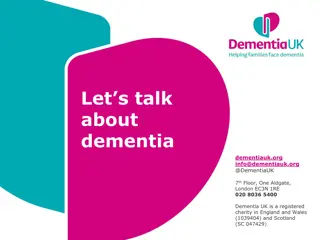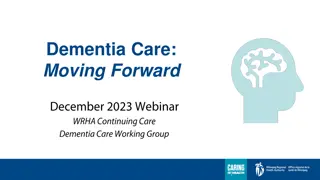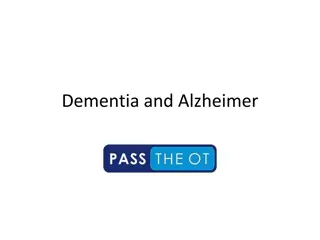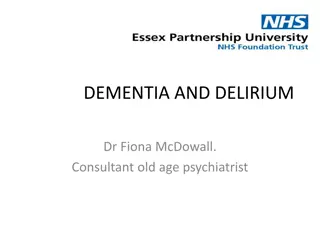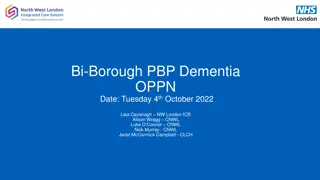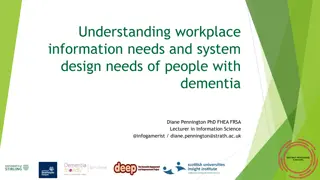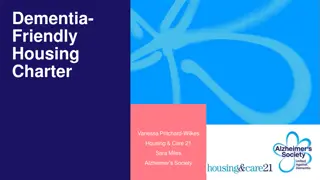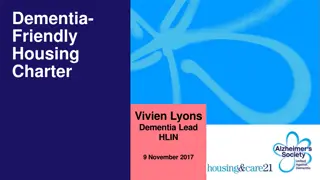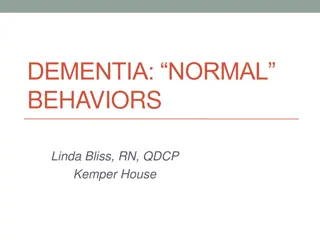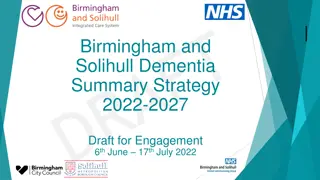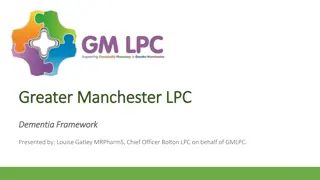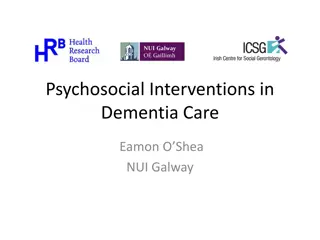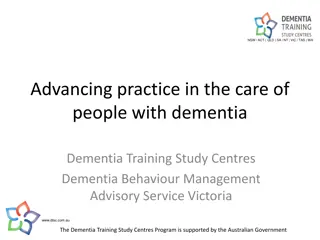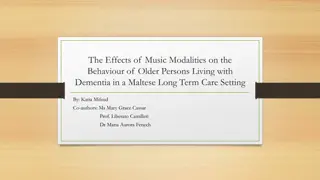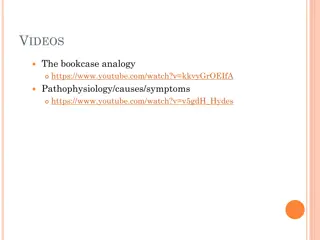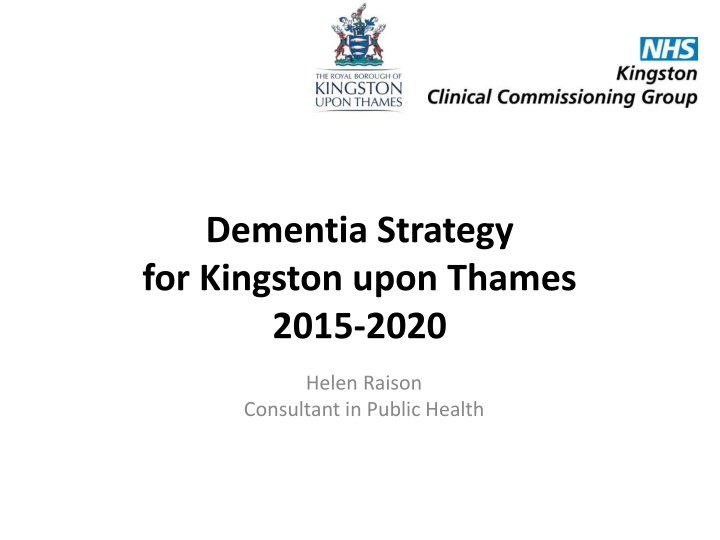
Dementia: Symptoms, Strategies, and Support in Kingston upon Thames
Explore the causes, symptoms, and impact of dementia, as well as local statistics and community feedback in Kingston upon Thames. Learn about strategies, resources, and services available to support individuals living with dementia.
Download Presentation

Please find below an Image/Link to download the presentation.
The content on the website is provided AS IS for your information and personal use only. It may not be sold, licensed, or shared on other websites without obtaining consent from the author. If you encounter any issues during the download, it is possible that the publisher has removed the file from their server.
You are allowed to download the files provided on this website for personal or commercial use, subject to the condition that they are used lawfully. All files are the property of their respective owners.
The content on the website is provided AS IS for your information and personal use only. It may not be sold, licensed, or shared on other websites without obtaining consent from the author.
E N D
Presentation Transcript
Dementia Strategy for Kingston upon Thames 2015-2020 Helen Raison Consultant in Public Health
What is dementia? Dementia is caused when the brain is damaged by diseases Alzheimer s Disease (AD) Vascular Dementia Mixed dementia Dementia with Lewy bodies Fronto-temporal dementia Rarer causes
Symptoms of dementia: unique, progressive Thinking or memory problems Day-to-daymemory - difficulty recalling events that happened recently Concentrating, planning or organising - difficulties making decisions, sequencing tasks eg cooking Language- difficulties following a conversation or finding the right word for something Visuo-spatial skills - problems judging distances (eg on stairs) and seeing objects in three dimensions Orientation- losing track of the day or date, or becoming confused about where they are Changes to mood frustrated or irritable, withdrawn, anxious, easily upset or unusually sad. Visual hallucinations or believe things that are not true (delusions) in some types of dementia Behaviours that seem unusual or out of character repetitive questioning, pacing, restlessness or agitation. They can be distressing or challenging for the person and their carer. Physical symptoms may be seen in the later stages of dementia muscle weakness or weight loss, altered sleep pattern and appetite
Dementia Video Grace: A progressive disease https://youtu.be/7wbYEK7O14E Carer stress http://bcove.me/wqfefq0b Living with dementia SCIE https://www.youtube.com/watch?feature=player_detailpage&v=loksPQ7 Q8tM Experience alz dis (USA) https://www.youtube.com/watch?v=LL_Gq7Shc- Y&feature=player_detailpage
Our Kingston population 1600 residents over the age of 65 have dementia (diagnosed and undiagnosed) which is expected to rise to over 1800 by 2020. 1826 people registered with GPs (Year 2014/2015) have dementia (diagnosed and undiagnosed) and will rise to 1900 by 2015/2016. 21.6% of older people with learning disabilities have dementia A small number of younger people with early-onset dementia. Most people with dementia have at least one other co-existing illness and nearly two thirds have two or more co-existing illnesses, such as depression, falls, mobility problems and urinary tract infections, diabetes
Local peoples views on living with dementia, and on local services Summer 2014, 200 people consulted Improving standards of Improving standards of (home)care and (home)care and consistency of consistency of (home)carers was cited (home)carers was cited most frequently. most frequently. ( (Report on Consultation with Older People with Mental Health Problems in Kingston, 2014) Most of this you learn as you go Most of this you learn as you go along either word of mouth or along either word of mouth or months down the line, we need months down the line, we need to know about these services to know about these services from the start. from the start. (Carer of: 65 (Carer of: 65- -79, Dementia 79, Dementia) [I am] lonely, as only support lonely, as only support worker visits worker visits (Local person with depression and memory problems)
Our Vision People with dementia, their carers and family feel Kingston is a place where they can live well in the community, and is one of the best boroughs in the country for dementia care and support.
The Strategy A document that sets out the case for change for the way that organisations and communities in the borough should respond to the needs of people with dementia A comprehensive set of objectives Draws on a Consultation in Summer 2014 Requires a multi-agency response Requires co-ordination
Outcomes for People with Dementia I was diagnosed early I understand, so I make good decisions and provide for future decision making I get the treatment and support which are best for my dementia Those around me and looking after me are well supported I am treated with dignity and respect I know what I can do to help myself and who else can help me I can enjoy life I feel part of a community and I am inspired to give something back I am confident my end wishes will be respected, I can expect a good death Adopted from the National Dementia Strategy
Strategy has four parts: Improving Wellbeing, Raising Awareness, Reducing risk Timely Diagnosis and Assessment and Intervention Living Well with dementia: Increasing Support in the Community High Quality Care in times of crisis, care home care and end of life care The strategy makes the case for change for each part Builds on last years Consultation exercise Sets out objectives i.e. what we want to achieve
Person-centred response Dementia Friendly environments towns, transport, shops, hospitals Memory Assessment Choice of place to live (home or good quality care home) Support groups Promotion of health and wellbeing for all Carers support Dementia friendly communities dementia friends -dementia champions Family Information and advice Crisis support Person with dementia Co-ordinated health, social and voluntary care Help with entitlements , advocacy, legal issues & Carers Ongoing help to navigate services End of life care Personal home care Good public awareness and understanding Universal services accessible to people with dementia
Timeline Summer 2014 Exploratory Consultation with people who have dementia and their carers Spring 2015 Age-Related Mental Health Board draft the strategy 12th May 2015 - Kingston CCG Council of Members reviewed draft strategy and agreed to direction of travel 11th June 2015 - Stakeholder Event - stakeholders refine, revise and sign up to strategy, begin setting priorities and action plan 11th June 2015 - Health Overview Panel -scrutinise the strategy 17th June 2015 - RBK Residents Health and Care Services Committee will review and recommend adoption to the HWBB 24th June 2015 - Health and Wellbeing Board will consider and adopt the strategy Summer 2015 onwards Implementation
Stakeholder Event 11th June Statutory sector, voluntary sector, independent organisations, people with dementia and their carers Review and revise the strategy Select the most important areas for action Start detailed action planning
Contacts Donal Hegarty, Mental Health Commissioner Donal.Hegarty@kingstonccg.nhs.uk Phil Moore, Clinical Sponsor Helen Raison, Consultant in Public Health Helen.raison@kingston.gov.uk

